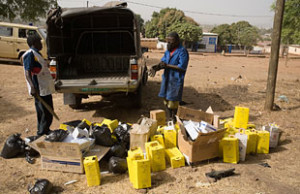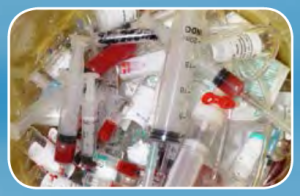Waste produced by health-care activities includes a wide range of materials, such as used needles and syringes, medical devices and radioactive materials, soiled dressings, body parts, blood, chemicals, diagnostic samples and pharmaceuticals.

Improper management of health-care waste potentially exposes patients, health-care workers, waste handlers, and the whole community at large, to infection, injuries, toxic effects, and risks of environmental pollution. It is vital that all medical waste materials be confined to their production points by putting them into hygienic refuse bins, properly handled and safely disposed of afterwards.


Tumore prostatico: la prognosi in base a stadio, grado e rischio
height=”261″ />
In the course of health-care activities, from radioactive isotopes to contaminated needles, has a higher potential to cause injury and infection than any other form of waste. And improper and/or inadequate medical refuse management has the likelihood to have devastating public health consequences and negative effects on the environment. That is why reputable and seasoned environmental consultants like Primefield worry!
Recently, the World Health organization (WHO) published a handbook that provides a comprehensive guideline on environmentally-sound, efficient and safe techniques for handling, disposal and management of health-care wastes in both normal and emergency situations. The said handbook, which is fully endorsed by Primefield, also discusses other related issues like the ever-changing disease patterns and climate change, and their impacts on the environment. Click here to download the Handbook on Safe Management of Health-care Wastes.
This WHO Handbook on Safe Management of Health-care Wastes recommends a special approach for medical settings where resources are severely-limited, by paying customized attention to basic technologies and processes that are not just safe, but also culturally-appropriate, sustainable and cost-effective. It targets hospital managers, policy makers, public health managers, environmental health professionals, environmental consultants, environmental activists and anyone who has interest and responsibility in waste management.

The World Health Organization (WHO) has revealed that environmental sanitation and hygiene development around the world is becoming worse than we think. It found out via a survey that about 2.4 billion people worldwide live under highly unsanitary conditions and have very poor hygienic behaviours that make enormous their exposure to widespread of infectious diseases. The body discovered that water stored at such homes is frequently contaminated because of inadequacies in water management. Furthermore, the survey found out that refuse management in most third world countries like Nigeria is inadequate: people throw trash on the streets, gutters and around their homes. These problems are receiving increasing attention. However, considering the huge accumulation of unfinished tasks within the sector, there is still a need for more resources and decision-makers at all levels to get involved for greater mobilization.

For several decades, WHO has been at the forefront of environmental sanitation and hygiene action and created some vital key materials that are intended for technical people and policy-makers dealing with such issues. The materials include, but are not limited to, guidelines, promotional materials and best practice documents.






